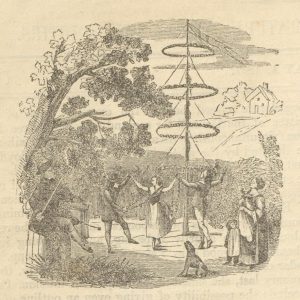[Editor: This article, regarding May Day, was published in Heads of the People: An Illustrated Journal of Literature, Whims, and Oddities (Sydney, NSW), 1 May 1847.]
May Day.

Also in the calendars, the month of May
Is marked the month of Love — two lovers stray,
In the old wood-cuts, in a forest green,
Looking their love into each others’ eyes,
And dreaming happiness that never dies;
And there they talk unheard, and walk unseen,
Save by the birds, who chant a louder lay
To welcome such true lovers with the May.
This is May Day, and although we in Australia are now entering on the last of our Autumn months, a few recollections of the most delightful of Old England’s Spring months may not be altogether out of place even at the antipodes:— a suggestion which our friends at home will not consider unseasonable, when we remind them that at the close of Autumn, as it is with us, the average temperature of the month is 66.—
“Then sing ye birds, sing, sing a joyous song!
And let our children bound
As to the tabor’s sound!
We in thought will join the throng,
Ye that pipe and ye that play,
Ye that through your hearts to-day
Feel the gladness of the May!”
And how shall we duly honour the illustration of our artist, who gives us the old English merry-making “round about the Maypole?” Let us take the following lines by L. E. L., and although they were written upon a picture of May-day in the “golden days of good Queen Bess,” we are assured they will be cordially applied even to the iron days of good Queen Victoria.”
On May Day.
O May, with all thy flowers and thy green,
Light welcome be thou, faire freshe May.Chaucer.
—————
Beautiful and radiant May,
Is not this thy festal day;
Is not this spring revelry
Held in honour, queen, of thee?
’Tis a fair: the booths are gay,
With green boughs and quaint display
Glasses, where the maiden’s eye
May her own sweet face espy;
Ribands for her braided hair,
Beads to grace her bosom fair;
From yon stand the juggler plays
With the rustic crowd’s amaze;
There the morris-dancers stand,
Glad bells ringing on each hand;
Here the Maypole rears its crest,
With the rose and hawthorn drest;
And beside are painted bands
Of strange beasts from other lands.
In the midst, like the young queen,
Flower-crowned, of the rural green,
Is a bright cheeked girl, her eye
Blue, like April’s morning sky,
With a blush, like what the rose
To her moonlight minstrel shows;
Laughing at her love the while, —
Yet such softness in the smile,
As the sweet coquette would hide
Woman’s love by woman’s pride
Farewell, cities! who could bear
All their smoke and all their care,
All their pomp, when wooed away
By the azure hours of May?
Give me woodbine scented bowers,
Blue wreaths of the violet flowers,
Clear sky, fresh air, sweet birds, and trees,
Sights and sounds, and scenes like these!
Source:
Heads of the People: An Illustrated Journal of Literature, Whims, and Oddities (Sydney, NSW), 1 May 1847, [p. 2]
Editor’s notes:
amaze = in context, an archaic form of “amazement”: the state of being astonished, astounded, surprised, and/or full of wonder
azure = the blue of a clear unclouded sky
bower = a shaded, leafy resting place or shelter, usually located within a garden or park and often made of latticework upon which plants (especially vines) are grown, or made out of intertwined tree boughs or vines (also known as an “arbor”) (“bower” can also refer to a country cottage or retreat, or to a woman’s bedroom or apartments in a medieval castle or mansion)
drest = an archaic form of the word “dressed”
espy = to see, to spot, to notice, to catch sight of (especially regarding something which is not easy to see, or to see something unexpectedly)
faire = an archaic spelling of “fair”
festal = of, relating to, or characteristic of, a festival, feast, or celebration; festive
freshe = an archaic spelling of “fresh”
gay = happy, joyous, carefree; well-decorated, bright, attractive (in modern times it may especially refer to a homosexual, especially a male homosexual; can also refer to something which is no good, pathetic, useless)
home = in an historical Australian context, Great Britain; may also refer to England specifically
Queen Bess = Elizabeth I (1533-1603), Queen of England and Ireland; during her reign, the realm was generally considered to be prosperous and stable, and she was given the nickname of “Good Queen Bess” (“Bess” is a diminutive form of “Elizabeth”)
riband = a ribbon, especially one used for decoration
rustic = of or relating to the countryside or rural areas; plain, rough, or simple in appearance or fashion; something typical of rural places or of the countryside; lacking refined etiquette or social graces; characteristic of or resembling rural people
tabor = a small drum which is played with a single drumstick, thus leaving the player’s other hand free to play a three-holed pipe (traditionally, the two instruments were used together)
thee = (archaic) you
thou = (archaic) you
thy = (archaic) your
’tis = (archaic) a contraction of “it is”
ye = (archaic) you (however, still in use in some places, e.g. in Cornwall, Ireland, Newfoundland, and Northern England; it can used as either the singular or plural form of “you”, although the plural form is apparently the more common usage)
yon = an abbreviation of “yonder”: at a distance; far away
[Editor: Changed “appled” to “applied”.]
Leave a Reply